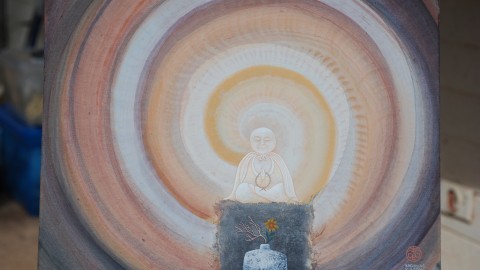Before we enter Yoga Sutra 25, let’s understand what Yam And Niyam is.
THERE are laws, and laws: laws to suppress man, laws to help him bloom; laws to Prohibit, restrict, and laws to help him expand, increase. A law which simply prohibits is destructive; a law that helps to grow and increase is creative. The Old Testament Ten Commandments are different from Patanjali’s laws. Those ten commandments prohibit, restrict, suppress. The whole emphasis is: you should not do this, you must not do this, this is not allowed. Patanjali’s laws are totally different; they are creative. The emphasis is not on what should not be done; the emphasis is on what should be done. And there is a vast difference between the two.
In the Old Testament it seems as if the laws are the goal – as if man exists for them, not that they exist for man. For Patanjali there is a utility in the laws, but they are not ultimate or absolute in any sense. Man doesn’t exist for them; they exist for man. They are means, and one has to go through them – and go beyond them. That has to be remembered; otherwise you can carry a wrong impression about Patanjali.
Ordinarily, religions have been very destructive. They have crippled the whole of humanity. They have made everybody guilty – and this is the greatest crime that can be done against man. And the whole trick is: first, you make people guilty; when they are trembling with guilt – afraid, scared, burdened, living in a hell – then you help them out of it, then you come and teach them how to be free. In the first place, why create guilt? And when man is guilty he becomes so crippled and so afraid of growth, so afraid to move and grow, so afraid to go into the unknown and the unfamiliar and the strange that he becomes static, a dead thing; then everybody is there working for his salvation.
Patanjali never makes you guilty about anything. In that sense he is more scientific than religious, more a psychologist than a religious priest. He is not a preacher. Whatsoever he is saying. He is simply giving you a blueprint of how to grow; and if you want to grow you need discipline. The discipline should not be imposed from the outside; otherwise it creates guilt. The discipline should come out of inner understanding, then it is beautiful. The difference is very subtle. You can be told to do something, and then you do it, but you do it like a slave. You can be helped to understand a certain phenomenon: through understanding you do it, then you do it as a master. Whenever you are a master you are beautiful; whenever you are a slave you become ugly.
I have heard one old Yiddish joke. There was a tailor named Zumbach. A man came to him. His suit was ready and he had come to take it, but the man found that one sleeve was longer than the other. He started fussing about it. Zumbach the tailor said, “So what? Why are you fussing so much? Look. This is a piece of art, and for just a small defect you are creating so much fuss. You can pull your hand inside a little, and then the sleeve will be okay.”
So the man tried, but when he pulled his hand inside he felt that a bunch of material had gathered on his back. So he said, “Now this bunch of material has gathered on my back.”
Said Zumbach the tailor, “So what? You can stoop a little, but this is a piece of art and I am not ready to change it. It looks so beautiful.”
So the man hunched over and walked out. Just outside when he was going home, it was very difficult to walk because one hand had to be pulled in, and then he had to remain hunched over so the suit remains beautiful – the man is completely forgotten; the coat has become more important, there came another guy and he said, “Such a beautiful suit. I bet it must have been prepared by Zumbach the tailor.”
The first man was surprised. He said, “How do you know?”
The man said, “How do I know? Only that type of tailor can make such a beautiful suit for a cripple like you.”
This is how it has been happening through all the religions to all humanity. They have made beautiful laws for you. “So what?” They say if you have to hunch over a little. “It’s okay. You look so beautiful.” It is the law that has to be followed and fulfilled: you are not the end; the law is the end. If you become crippled it is okay, if you become a hunchback it is okay, if you become ill it is okay – but the law should be fulfilled.
Patanjali is not giving you laws of that type, no. He understands more. He understands the whole situation. The laws are there to help you. They are really like a structure which is made before you start constructing a building, the scaffold. It helps the new building to come up; once the building is ready the structure has to be taken away. It was for a certain purpose; it was not the end.
All these laws are for a certain purpose: They help you grow.
The first was yam, self-discipline. You must have observed – the five great vows, ahimsa, satya, etcetera; they have a peculiar quality about them: you can practice them only in society. If you are living alone in a forest you cannot practice them; then there is no need and no opportunity. You have to be true when somebody else is there. When you are alone on a Himalayan peak there is no question of truth because how can you lie there – to whom? The opportunity does not exist.
Yam is a bridge between you and others, and that is the first thing: that you should settle things between you and others. If things are unsettled between you and others they will constantly create worry. “Close all accounts with others” – that is the meaning of the first, yam. Hmm?… if you are fighting with people, the tension, the worry will be there; even in your dreams it will become nightmares.
It will follow you like a shadow. It will be wherever you are. Eating, sleeping, meditating – the anger, the violence will be there. It will discolor everything. It will destroy everything. You cannot be at peace, at home.
So Patanjali says, first, with yam, you settle things with people. Don’t be untrue, don’t be violent, don’t be possessive, so that between you and others there exists no conflict – a harmony. This is the first circle of your being – your periphery, where you touch others’ peripheries. This has to be calmed down so you are in a deep friendship with the whole. In that deep friendship only, growth is possible.
Otherwise, worries from the outside will be too many, and they will attract attention and they will distract and they will dissipate energy, and they will not leave you at peace and alone. If you are not at peace with others, you cannot be at peace with yourself. How can you be?
So the first thing is to be at peace with others so that you can be at peace with yourself. The periphery has no waves; suddenly a calm, collected phenomenon happens to your being. The first is between you and others.
Now is the second step: niyam. Niyam means “the law.” This has nothing to do with others; you have done that. Now, something you have to do with yourself.
So if you move to a Himalayan cave, the first step will not be possible because others will not be there. But you will have to follow the second step there also because it doesn’t belong to a social situation – it belongs to your aloneness. Yam is between you and others; niyam is between you and yourself.
Tags: Patanjali Yam And Niyam










